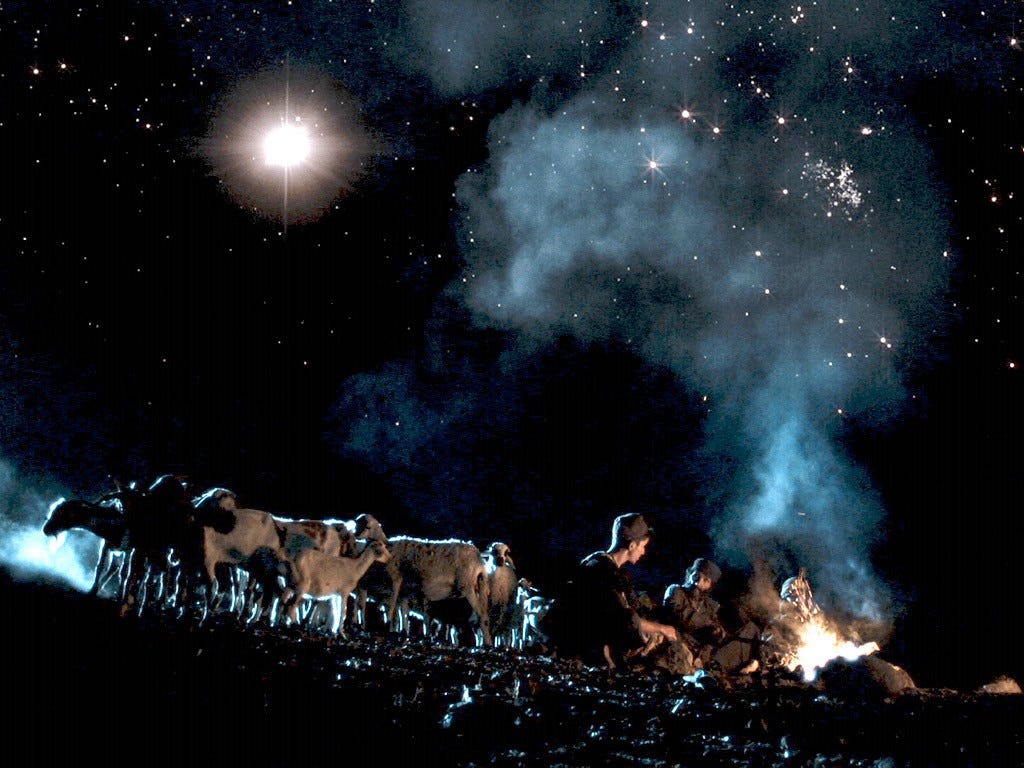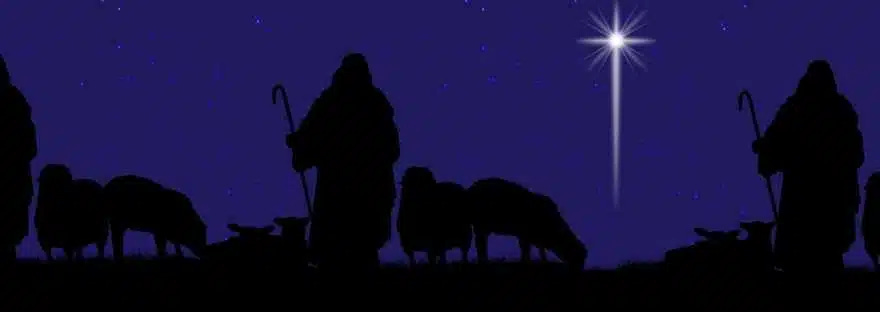The end of all our exploring will be to arrive where we started, and know the place for the first time.
Advent Day 21: The Shepherds
The shepherds would have been alert the night the angel came. Every night, really. That was their gift: the ability to be still and listen, to see in the dark. The lives of their sheep depended on these qualities, especially in those days when jackals still roamed that far edge of the Roman empire. Shepherds are, by nature and necessity, suspicious types. Still, they never suspected this: an angel in their midst.
We do not know how she arrived. Did she come in silence, as a feeling out on the edge of their consciousness, then work her way in? Was she at first a formless shadow beyond the glow of their campfire, only slowly taking shape? Or was she the shock-and-awe type, arriving in a blaze of light?
We do not know. What the story records is that once she made herself known, the glory of the Lord shone around the shepherds, and they were sore afraid.
You can imagine the varied reactions as fight-or-flight instincts kicked in: stunned silence, a whimper caught in a throat; a shouted warning to stay back; crazed and bleating sheep. No doubt, the bravest shepherd rushed the angel, staff raised, ready to strike, only to be halted in his tracks by this startling proclamation:
Behold, I bring you good tidings of great joy, which shall be to all people. For unto you is born this day in the city of David a Savior, which is Christ the Lord. And this shall be a sign unto you; You shall find the babe wrapped in swaddling clothes, lying in a manger.
Then the angel was joined by a heavenly host, singing,
Glory to God in the highest, and on earth peace, good will toward men.
Then, just as quick as they came—poof!—they were gone, the night restored to stillness and dark.
The story goes that, after the angel was gone, the shepherds talked it over. Then it was decided: they would go to Bethlehem and find the baby.
We imagine them setting off right then. That’s what the Christmas pageants and movies show. But no shepherd would do that. And not just because he feared losing his job. Shepherds are born protectors. That’s why—as the text says—they were abiding in their field that night. In the Greek of the gospels, the word is meno: to dwell among, remain with, be present to, hold and keep. No abiding shepherd would abandon his flock to the jackals.
More likely, they waited for dawn when another shepherd crew arrived. Or they returned the flock to its owner. Or, at the very least, they penned the sheep in the safest place they knew. In any case, at some point they were finally free, and off they went in search of Love.
A baby wrapped in swaddling cloths, lying in a manger in Bethlehem. As far as a map went, it wasn’t much. But it was all they had. If anyone could find this baby, it would be them. Shepherds are made for seeking out what is hidden, what seems lost. So we must imagine them on their quest for God, going door-to-door, asking if anyone had a newborn lying in a feed trough out in their stable.
The reactions they must have got! Mockery, eye rolls. No doubt they would have been impatiently brushed off by those who ran businesses catering to the crowds in for the census. Who had time for such ridiculous inquiries?
The shepherds might have felt wounded by such slights before, but not now. The angel’s visit had changed everything. She had heralded the end of life as they knew it. Or had she heralded a beginning? They argued over these spiritual semantics as they moved through the tight streets of Bethlehem, as door after door was slammed in their faces. Whatever the case—end or beginning, beginning or end—they would not stop until they had found the baby.
But could they have stopped, if they wanted? Could they just have taken the angel’s word for it then gone about their business?
No.
Generally speaking, shepherds are mystics. They are spiritually tactile. Like a man named Thomas a couple generations later, they must touch a thing to know it.
So, on they went until, finally…an inn.
“Well, as a matter of fact, yes,” the innkeeper said when they asked about a baby in a manger. “Let me show you.”
He led them through a courtyard, past a crowd of census tourists, and through a low door. Then it was just like the angel said: a swaddled newborn asleep in a manger. And a mother and a father—lowly like them—who let them come near. The shepherds knelt down and peered at the little thing: his pink face, the downy hair over his soft spot, a dribble of mothers milk on his chin. Now doesn’t that just beat all, they must have said to one another: God as a baby.
This is the one moment in these shepherds’ lives that so many artists have chosen to depict throughout the ages. But what of later? What of the rest of their lives? According to scripture, they returned to their fields, and along the way,
…spread the word concerning what had been told them about this child.
Before long, they were back to being shepherds. All their seeking-and-finding had led them right back to where they started. But it was not the same place they’d left, for they were not the men who’d left. They were meeting it all again, as if for the first time—the sheep, the fields, the hills, one another, themselves. Looking through the eyes of Love, everything that had once been ordinary was now extraordinary. Isn’t this always the way when we have been touched by Love? We can’t ever return to being untouched. Thank God for that.
As T.S. Eliot put it centuries after the shepherds,
We shall not cease from exploration
And the end of all our exploring
Will be to arrive where we started
And know the place for the first time.In years to come, the shepherds would often reminisce about that night. The angel. The bustling town. The inn and stable. The parents. The baby. They would have gone over all the details, again and again, fitting them together like tiles until it all formed a beautiful mosaic in their memories. The experience had left them with many questions. But they had met Love; that was the only answer they needed. For what remained unanswered, they were content to let the mystery be…to live the remainder of their days out on the vast, open field of wonder and awe.
Practice
One of the most beautiful Christmas songs out there, in my opinion, is Stables by Peter Mayer. To me, it captures the true reason for the season. For practice today, find a quiet spot, close your eyes, have a listen, and let yourself feel whatever it brings up for you.
In Bethlehem a manger waits, Long ago and so today, Where hatred-weary people pray, Love will come and lay there. And so do countless stables stand In hearts as harsh as desert lands, Rough shelters in the wind and sands, So love will come and stay there. Love that opens fists of hate, Heaps up gold on beggars’ plates, Love that shows a kindly face To enemies and strangers. And the walls of stables tremble so When the winds of fear and judgement blow, For a stable hopes in love alone And knows that love’s the answer. O love the prophet’s only word, The only lesson left to learn, The only end of heaven’s work, And the only road that goes there. Love that sees with mercy’s eyes, Holds its arms out open wide, Threads its loom with separate lives, And weaves them all together. So may the lamps of stables glow Brightly that their light may go For miles in the darkness so Love will find its way there.
Holiday Happenings at Life In The City
All gatherings listed below happen at 205 East Monroe Street in Austin, Texas.
Sun. Dec. 8, 11:15am: LITC's original holiday musical, Make Room In Your Heart. Sat. Dec. 21, 6:00pm: Blue Christmas, an intimate gathering on the longest night. Mon. Dec. 23, 6:00pm: Christmas Eve-Eve candlelight service...an LITC tradition! Sun. Dec. 29, 11:15am: Welcome 2025 with a casual service of coffee, cookies, conversation and resolution-making.
Contemplation In The City
Life In The City’s contemplative community meets regularly to practice sacred traditions like Lectio Divina and Centering Prayer. If you’re in Austin, consider joining us. Upcoming in-person gatherings are Jan. 14, Feb. 4, Mar. 4, Apr. 8, May 6. We meet at 205 East Monroe Street in Austin. Doors open at 6pm for coffee and conversation, service from 7-8pm. You might also find meaning in our monthly newsletter in which we wrestle with how to live a spiritually engaged life in the modern world. Read more here.
Ready For More?
Read the Introduction to the 2022 edition, to find out how my experience of September 11, 2001 became my gateway to Advent.
Find more mystics, saints and prophets in our Archive.
Feedback
Catch a typo? Have suggestions for mystics, saints and prophets for a future year? Leave feedback in the Comments below or email Greg Durham at greg@litcaustin.org.








I love this meditation on the shepherds, especially as I look for inspiration for my Christmas Eve sermon! Garrison Keillor once called shepherds “the parking lot attendants of the ancient world!” Maybe unfair but probably a rough uneducated lot who got to be recipients of this fabulous visitation of angels and messengers of what they saw. I also love that you bring Thomas into the story on this his feast day!